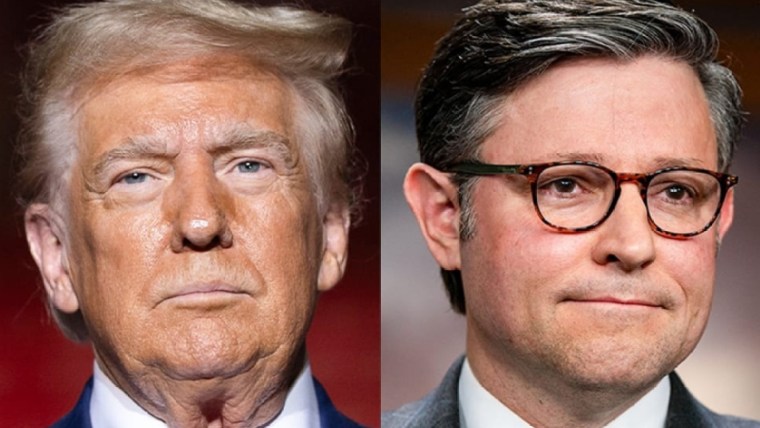Outside a New Year’s Eve gathering at his Mar-a-Lago club, Donald Trump was asked to make the case for Rep. Mike Johnson, R-La., to continue as House speaker. “He’s the one that can win right now,” Trump replied.
Well, if that isn’t a ringing endorsement, I don’t know what is. But by Trumpian standards, “he’s the one that can win” is an honest answer, because the president-elect isn’t looking for a capable speaker. The truth is Johnson has what Trump needs: a working pulse, total loyalty and utter disposability. That’s all that’s required to be the next fall guy for the new Trump era.
When things go wrong, Trump can blame Johnson, toss him aside and wait for the next warm body to fill the post.
As of Friday morning, Republicans’ narrow majority means it’s still unclear whether that fall guy will be Johnson or someone else with those three traits, all widely available in the House GOP caucus. Republicans emerged from the 2024 elections with a 220-215 advantage in the chamber. Their count shrunk by one last month when disgraced Rep. Matt Gaetz of Florida resigned from Congress and announced he wouldn’t return in the new year despite winning re-election.
Unless Gaetz tries to slink back into his old seat, Johnson will enter the day with just two votes to spare. Already, one Republican, Thomas Massie of Kentucky, has announced his opposition. Several others, such as Chip Roy of Texas, remain uncommitted; still others, Rep. Victoria Spartz of Indiana, are seeking concessions from Johnson. And, echoing the first Trump administration’s lack of intuitional understanding and basic competence, Punchbowl reports that the president-elect’s “relatively inexperienced legislative affairs staff ... seems to be scrambling to figure out who else is a no.”
That said, the House has two motivations for wrapping things up sooner rather than later. The first is purely personal: As Punchbowl noted Thursday, “members don’t get paid if they don’t get sworn in, which happens after the speaker vote.” The second is that the House just has three days to get up and running before it’s scheduled to certify Trump’s election win on Monday. And since the most obvious alternatives to Johnson — House Majority Leader Steve Scalise, R-La., Majority Whip Tom Emmer, R-Minn., and Judiciary Committee Chair Jim Jordan, R-Ohio — don’t have quick paths to 218 votes, the clock works to the current speaker’s advantage.

If Johnson does eke out re-election as speaker, he will be volunteering to be a fitting first scapegoat. Like so many of the once and future president’s most fervent supporters, Johnson is an evangelical Christian who has nevertheless backed a steadfastly sinful man. And, crucially for Trump, Johnson’s backing takes the sycophantic approach. Even before he became speaker, Johnson recruited his colleagues to sign an amicus brief supporting Texas’ lawsuit to invalidate the 2020 election results. He has already bowed and scraped before Trump multiple times since becoming speaker just over a year ago, including an especially embarrassing news conference for a bill to restrict noncitizen voting — which is already illegal.
Equally crucial for Trump is Johnson’s expendability. True, the speaker doesn’t arouse the enmity of any of the House GOP’s various factions — the self-proclaimed “five families.” But neither does he have any constituency of his own. So when things go wrong, Trump can blame Johnson, toss him aside and wait for the next warm body to fill the post.
The centers of power in the new Trump era are still taking shape, but one thing is clear: None of them will be in the speaker’s office.
And things will go wrong. The government funding fight last month, when more than 30 Republicans defied Trump’s demand that they vote for a debt ceiling increase, dashed any dreams that his second administration would have an easier time getting his preferred legislative deals passed. But Trump didn’t get where he is today by admitting blame, so Johnson — or whoever is speaker — will have to take the fall.
Johnson’s defenders, such as they are, might argue that the speaker has no choice but to defer. With Republicans in control of the White House and the Senate, as well, the argument goes, any attempt by him to steer the Republican ship during the next two years will only come to grief. But past speakers in Johnson’s position have exerted extraordinary influence. After Democrats lost their Senate supermajority in 2010, for example, President Barack Obama’s staff wanted to scrap the Affordable Care Act in favor of a much smaller bill. But Speaker Nancy Pelosi, D-Calif., persuaded Obama to stick with the legislation, saving the ACA.
Johnson will exert no such influence. The centers of power in the new Trump era are still taking shape, but one thing is clear: None of them will be in the speaker’s office. The right’s recent fight over H-1B visas, between the most zealous MAGA die-hards and Silicon Valley billionaires, confirmed what the budget fight suggested: The billionaires both inside and outside the official administration will run things, while elected GOP lawmakers will be expected to follow their orders. Whatever the outcome, it won’t reflect the will of the voters.

